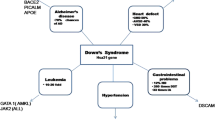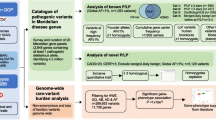Abstract
Noonan syndrome (NS; OMIM 163950) is an autosomal dominant RASopathy with variable clinical expression and genetic heterogeneity. Clinical manifestations include characteristic facial features, short stature, and cardiac anomalies. Variants in protein-tyrosine phosphatase, non-receptor-type 11 (PTPN11), encoding SHP-2, account for about half of NS patients, SOS1 in approximately 13%, RAF1 in 10%, and RIT1 each in 9%. Other genes have been reported to cause NS in less than 5% of cases including SHOC2, RASA2, LZTR1, SPRED2, SOS2, CBL, KRAS, NRAS, MRAS, PRAS, BRAF, PPP1CB, A2ML1, MAP2K1, and CDC42. Several additional genes associated with a Noonan syndrome–like phenotype have been identified. Clinical presentation and variants in patients with Noonan syndrome are this study’s objectives. We performed Sanger sequencing of PTPN11 hotspot (exons 3, 8, and 13). We report molecular analysis of 61 patients with NS phenotype belonging to 58 families. We screened for hotspot variants (exons 3, 8, and 13) in PTPN11 gene by Sanger sequencing. Twenty-seven patients were carrying heterozygous pathogenic variants of PTPN11 gene with a similar frequency (41.4%) compared to the literature. Our findings expand the variant spectrum of Moroccan patients with NS phenotype in whom the analysis of hotspot variants showed a high frequency of exons 3 and 8. This screening test allowed us to establish a molecular diagnosis in almost half of the patients with a good benefit–cost ratio, with appropriate management and genetic counseling.
Similar content being viewed by others
Abbreviations
- NS:
-
Noonan syndrome
- PCR:
-
Polymerase chain reaction
- NA:
-
Not available
References
Bertola DR, Pereira AC, Albano LMJ, De Oliveira PSL, Kim CA, Krieger JE (2006) PTPN11 gene analysis in 74 Brazilian patients with Noonan syndrome or Noonan-like phenotype. Genet Test 10(3):186–191
Digilio M, Marino B (2001) Clinical manifestations of Noonan syndrome. Images Paediatr Cardiol 3(2):19–30
Essawi ML, Ismail MF, Afifi HH, Kobesiy MM, El Kotoury A, Barakat MM (2013) Mutational analysis of the PTPN11 gene in Egyptian patients with Noonan syndrome. J Formos Med Assoc Taiwan Yi Zhi 112(11):707–712
Faienza MF, Giordani L, Ferraris M, Bona G, Cavallo L (2009) PTPN11 gene mutation and severe neonatal hypertrophic cardiomyopathy: what is the link? Pediatr Cardiol 30(7):1012–1015
Ferrero GB, Baldassarre G, Delmonaco AG, Biamino E, Banaudi E, Carta C et al (2008) Clinical and molecular characterization of 40 patients with Noonan syndrome. Eur J Med Genet 51(6):566–572
Hung CS, Lin JL, Lee YJ, Lin SP, Chao MC, Lo FS (2007) Mutational analysis of PTPN11 gene in Taiwanese children with Noonan syndrome. J Formos Med Assoc Taiwan Yi Zhi 106(2):169–172
Kosaki K, Suzuki T, Muroya K, Hasegawa T, Sato S, Matsuo N et al (2002) PTPN11 (protein-tyrosine phosphatase, nonreceptor-type 11) mutations in seven Japanese patients with Noonan syndrome. J Clin Endocrinol Metab 87(8):3529–3533
Lee ST, Ki CS, Lee HJ (2007) Mutation analysis of the genes involved in the Ras-mitogen-activated protein kinase (MAPK) pathway in Korean patients with Noonan syndrome. Clin Genet 72(2):150–155
Lepri FR, Scavelli R, Digilio MC, Gnazzo M, Grotta S, Dentici ML et al (2014) Diagnosis of Noonan syndrome and related disorders using target next generation sequencing. BMC Med Genet 23(15):14
Linglart L, Gelb BD (2020) Congenital heart defects in Noonan syndrome: diagnosis, management, and treatment. Am J Med Genet C Semin Med Genet 184(1):73–80
Musante L, Kehl HG, Majewski F, Meinecke P, Schweiger S, Gillessen-Kaesbach G et al (2003) Spectrum of mutations in PTPN11 and genotype-phenotype correlation in 96 patients with Noonan syndrome and five patients with cardio-facio-cutaneous syndrome. Eur J Hum Genet EJHG 11(2):201–206
Narayanan DL, Pandey H, Moirangthem A, Mandal K, Gupta R, Puri RD et al (2017) Hotspots in PTPN11 gene among Indian children with Noonan syndrome. Indian Pediatr 54(8):638–643
Pierpont ME, Digilio MC (2018) Cardiovascular disease in Noonan syndrome. Curr Opin Pediatr 30(5):601–608
Razzaque MA, Nishizawa T, Komoike Y, Yagi H, Furutani M, Amo R et al (2007) Germline gain-of-function mutations in RAF1 cause Noonan syndrome. Nat Genet 39(8):1013–1017
Roberts AE, Araki T, Swanson KD, Montgomery KT, Schiripo TA, Joshi VA et al (2007) Germline gain-of-function mutations in SOS1 cause Noonan syndrome. Nat Genet 39(1):70–74
Roberts AE, Allanson JE, Tartaglia M, Gelb BD (2013) Noonan syndrome. Lancet Lond Engl 381(9863):333–342
Romano AA, Allanson JE, Dahlgren J, Gelb BD, Hall B, Pierpont ME et al (2010) Noonan syndrome: clinical features, diagnosis, and management guidelines. Pediatrics 126(4):746–759
Sakamoto K, Imamura T, Asai D, Goto-Kawashima S, Yoshida H, Fujiki A et al (2014) Acute lymphoblastic leukemia developing in a patient with Noonan syndrome harboring a PTPN11 germline mutation. J Pediatr Hematol Oncol 36(2):e136-139
Sarkozy A, Conti E, Seripa D, Digilio MC, Grifone N, Tandoi C et al (2003) Correlation between PTPN11 gene mutations and congenital heart defects in Noonan and LEOPARD syndromes. J Med Genet 40(9):704–708
Sznajer Y, Keren B, Baumann C, Pereira S, Alberti C, Elion J et al (2007) The spectrum of cardiac anomalies in Noonan syndrome as a result of mutations in the PTPN11 gene. Pediatrics 119(6):e1325-1331
Tartaglia M, Kalidas K, Shaw A, Song X, Musat DL, van der Burgt I et al (2002) PTPN11 mutations in Noonan syndrome: molecular spectrum, genotype-phenotype correlation, and phenotypic heterogeneity. Am J Hum Genet 70(6):1555–1563
Tartaglia M, Gelb BD, Zenker M (2011) Noonan syndrome and clinically related disorders. Best Pract Res Clin Endocrinol Metab 25(1):161–179
Tartaglia M, Aoki Y, Gelb BD (2022) The molecular genetics of RASopathies: An update on novel disease genes and new disorders. Am J Med Genet C Semin Med Genet 190C:425–439
Zenker M, Lehmann K, Schulz AL, Barth H, Hansmann D, Koenig R et al (2007) Expansion of the genotypic and phenotypic spectrum in patients with KRAS germline mutations. J Med Genet 44(2):131–135
Acknowledgements
We thank the patients and their families.
Author information
Authors and Affiliations
Corresponding author
Ethics declarations
Consent for publication
Each parent of the patients gave written consent for clinical data to be published.
Additional information
Communicated by: Ewa Ziętkiewicz
Publisher's Note
Springer Nature remains neutral with regard to jurisdictional claims in published maps and institutional affiliations.
Rights and permissions
Springer Nature or its licensor (e.g. a society or other partner) holds exclusive rights to this article under a publishing agreement with the author(s) or other rightsholder(s); author self-archiving of the accepted manuscript version of this article is solely governed by the terms of such publishing agreement and applicable law.
About this article
Cite this article
Ouboukss, F., Adadi, N., Amasdl, S. et al. High frequency of hotspot mutation in PTPN11 gene among Moroccan patients with Noonan syndrome. J Appl Genetics 65, 303–308 (2024). https://doi.org/10.1007/s13353-023-00803-6
Received:
Revised:
Accepted:
Published:
Issue Date:
DOI: https://doi.org/10.1007/s13353-023-00803-6




